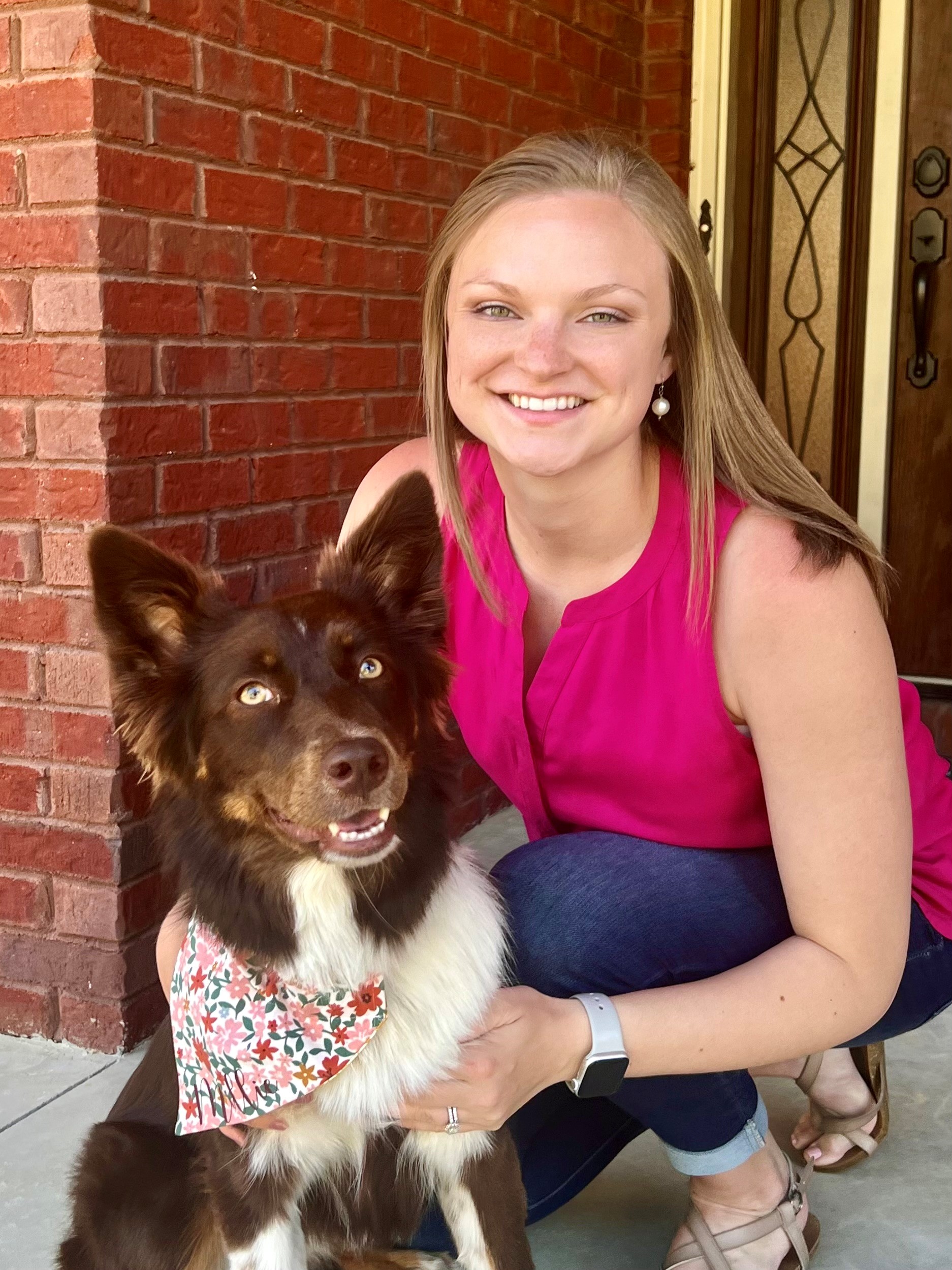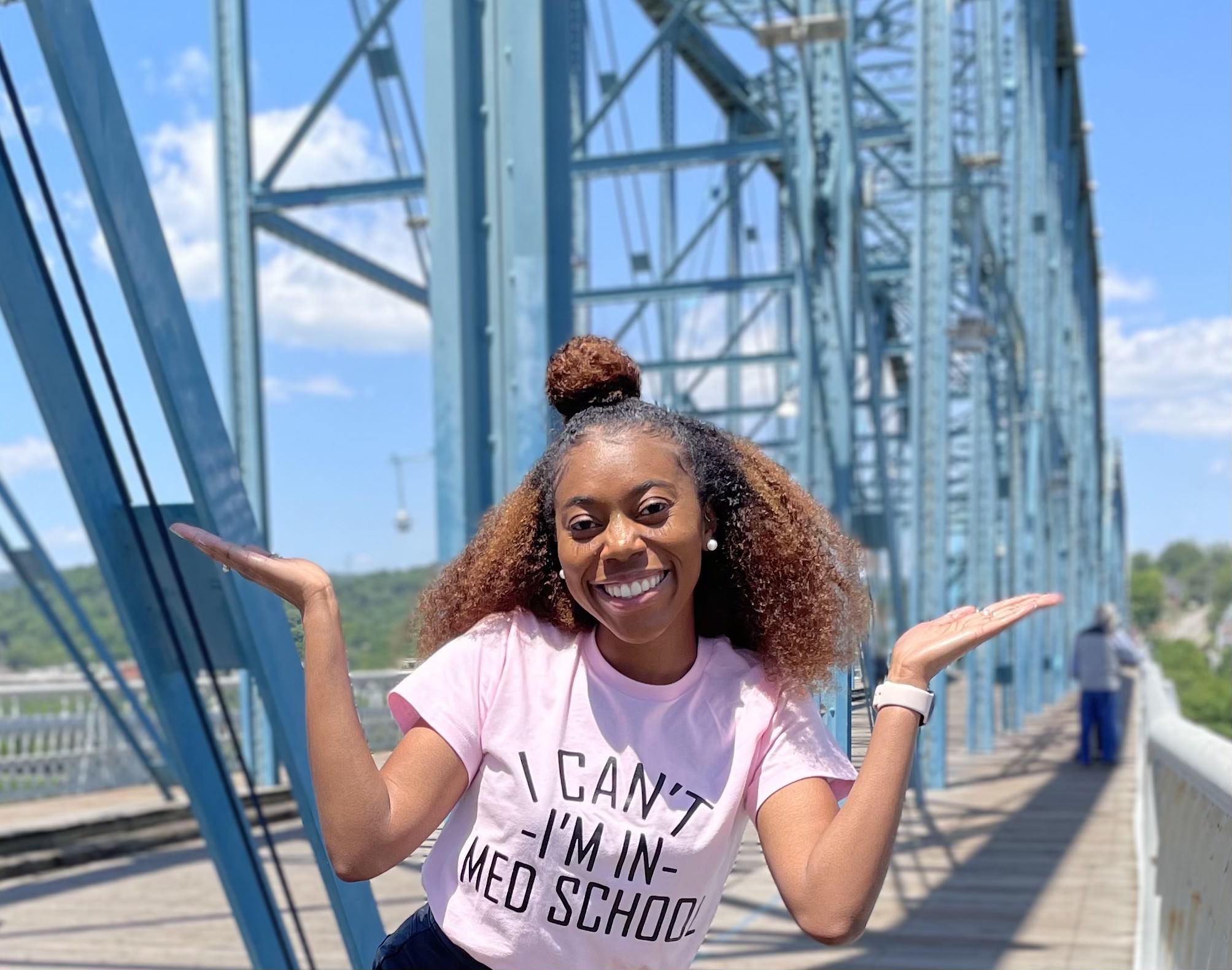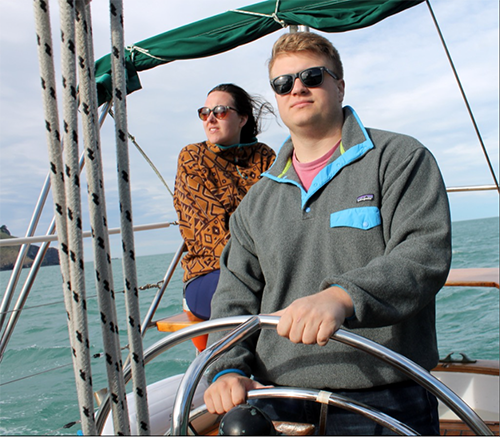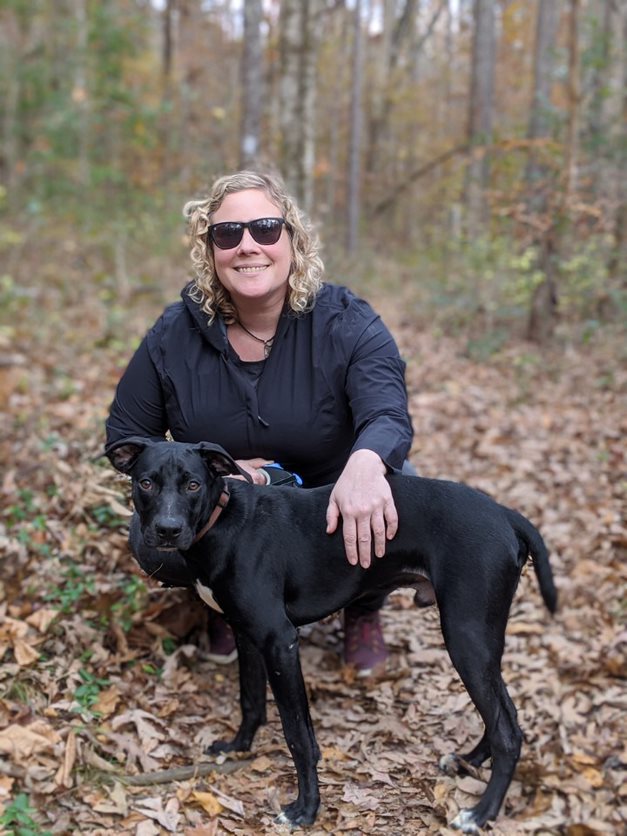As their first year of medical school comes to a close, our co-coordinators reached out to MS1s LC, Ataya, Ben, and Jamie to chat about what this year has meant to them, what they’ve enjoyed the most, and how it has lived up to, or differed from, their expectations:
 Laura Catherine (LC) Cresswell, Huntsville Campus (Rural Medicine Program)
Laura Catherine (LC) Cresswell, Huntsville Campus (Rural Medicine Program)
1. What surprised you the most about medical school?
I have been pleasantly surprised with the amount of free time that I have to continue the hobbies I had before starting school, and even pick up a few more. Before starting, I assumed I would have to give up spending time with family, crafting, and being able to go on adventures with my husband and dog. Although school takes up a lot of time, I still find space for things I love.
2. What has been your favorite block so far and why?
My favorite block so far has been learning about the Cardiovascular system. For me, this information has been the easiest to take background knowledge and basic physiology and apply it to an array of clinical presentations. The block leaders, Dr. Litovsky and Dr. Doppalapudi, helped with the transition into organ modules and found a way to make the subject more fun, too.
3. If you are a part of any of the special pathways offered (urban underserved, rural medicine, etc.), please describe what made you apply for that track.
I am part of the Rural Medicine Program (RMP) and the Comprehensive Urban Underserved and Rural Experience Program (CU2RE). I applied for RMP before applying to medical school. This program includes a pre-matriculation year at Auburn where I was able to take classes to build a foundation in subjects, like physiology and histology, that we reference frequently in school. Both programs also give opportunities for small group learning on how to combat common problems seen in underserved communities.
4. Any plans for the summer?
This summer I have plans to go on a mission trip to the Dominican Republic with the Christian Medical Ministries of Alabama. I will also shadow a family physician in rural Alabama for a few weeks as part of the Pathways Program and attend the National and State Conferences for the American Academy of Family Physicians.
 Ataya Spears, Birmingham Campus
Ataya Spears, Birmingham Campus
1. How was the adjustment to medical school for you?
Honestly, I found it difficult to balance my studies and my other obligations. I have since learned that a true balance is nearly impossible to achieve but having a schedule (and sticking to it!) will get you pretty close! I have two deep-study blocks every day, one in the morning and one in the evening. I use the afternoon to watch the new lectures. This is a very loose schedule, but it works for me because it is flexible enough to account for mandatory classes and social activities! My biggest tip for adjusting to medical school would be to figure out what works best for YOU and run with it!
2. What surprised you the most about medical school?
I was most surprised by how supportive the community is! Through the years, I have heard so many horror stories about how cutthroat medical school can be, so it was really refreshing to get to UAB and feel like everyone wants to see you succeed. Faculty and staff are always available, and my classmates always come in clutch with super helpful resources!
3. What has been your favorite block so far and why?
It’s a toss-up between microbiology and cardiovascular because I enjoyed them both so much! Both blocks have amazing course directors, and the material flows very well. I think micro has a slight edge simply because you can complete the bulk of your studying by watching Sketchy videos!
4. If you could tell yourself anything before you matriculated, what would you say?
I would say to give yourself grace. Medical school is unlike anything you’ve ever done before and it’s okay if you don’t get it right the first time. When it comes to your study sessions, prioritize quality over quantity! Sometimes you’ll be tempted to spend every waking moment studying, but that doesn’t always equal success.
 Ben Rogers, Tuscaloosa Campus (Primary Care Track)
Ben Rogers, Tuscaloosa Campus (Primary Care Track)
1. How was the adjustment to medical school for you?
I took a gap year between medical school and undergrad, so switching from a 9-5 job back to school was definitely a bigger challenge than I thought it would be. I had heard all of the awful sayings about firehoses and pancakes that everyone loves to use to explain why medical school is hard, but it wasn’t until I got here that I knew what they were talking about. The best tips I have for adjusting are ask the people above you (we love to share resources and advice) and give yourself some grace; it’s normal to take time to adjust to med school, but you can do it!
2. What has been your favorite block and why?
My favorite block so far has been cardiovascular. Coming into med school I was most interested in learning about hypertension, hyperlipidemia, and diabetes. Two of those were covered in great detail in this block, so obviously I loved it. We also got to meet and learn about hypertension from Dr. Oparil (look her up; she’s an icon). We had some of the greatest block directors possible: Dr. Litovsky and Dr. Doppalapudi. If you’re a primary care nerd like me, I think you’ll love this block because they cover a lot of things that you will see a lot in your practice one day.
3. What are some of the ways that you have gotten involved?
I have signed up for quite a few things here at UAB. I’m going to be one of your orientation leaders! I’m very excited to welcome you guys to campus and I’m working with Dr. Peterson and the great Riley Duke to create a curriculum to help you guys figure out what picking a specialty looks like. I’m also a learning community representative for the Hirschowitz Learning Community. We are the greatest LC and I will stand by that statement forever. I’m also a health equity scholar which is what I’m most excited about. It’s an amazing community of people who want to make the medical field a better and more inclusive place. I cannot recommend HES enough.
4. If you could tell yourself anything before matriculating, what would you say?
Do absolutely nothing before school starts, and don’t spend a second of your day feeling guilty or lazy about it. When I was coming in multiple people told me not to do anything and to just enjoy my summer and come into school relaxed. I, sadly, heeded only the first half of this advice and did pretty much nothing, but almost daily I would catch myself feeling guilty for watching Netflix, running, and buying an alarming number of houseplants when I thought that I maybe should be studying. Don’t be like me. They will teach you everything you need to know, so spend all of the time possible doing what you love. Go on day trips, see friends, hangout with your family. You’ll have time to do those things in school, but it takes more scheduling and planning to get that done.
5. What are you doing this summer?
I’m very excited because I got a plot in the UAB Sustainability Community Garden, so my summer will be spent gardening and watching the growth of my watermelon plants, Walter and Wanda. I also plan on catching up with my reading list which has grown quite long this year. I’ll also be traveling for weddings and to see family.
 Jamie Davison, Birmingham Campus
Jamie Davison, Birmingham Campus
1. How was the adjustment to medical school for you?
The adjustment period had pros and cons. I’m a non-traditional student, coming from another career, so I really enjoyed getting to choose whether to attend class in person or watch recorded lectures. I love the flexibility about when and where to get my work done. What I found most challenging was getting used to the volume of material introduced each day. However, the transition was a lot smoother because I leaned a little on my awesome classmates and went to Medical Student Services (MSS) when I needed help.
2. What has been your favorite block and why?
My favorite block so far was the cardiovascular module, which is the first organ module in January after Fundamentals. The different subjects from Fundamentals are all integrated and applied once organ modules start. That continuity and complexity really fascinated and motivated me, and still does. Our block directors from the cardio module were also amazing because they were so fun and engaged, and they organized the content really well.
3. What are some of the ways you have gotten involved?
Part of my background is in education, so I was eager to participate on the Medical Education Committee, which has been an incredible experience. Also, there are student interest groups at UAB that focus on everything, from medical specialties to service activities, and I’ve been involved in some of those, too. Finally, volunteering at the school’s free clinic, Equal Access Birmingham (EAB) has been one of the highlights of my first year.
4. If you could tell yourself anything before you matriculated, what would you say?
Try to get everything fully settled before the first day of orientation, especially if moving from out of state. There was less time than I expected after day one to handle all of the little things, like setting up Wi-Fi, getting an Alabama driver’s license, and getting last minute household items.
5. Any plans for the summer?
I’m looking forward to joining a research lab and working on a service project this summer. There are so many exciting opportunities for the summer after the first year of medical school that it can be hard to narrow them down!